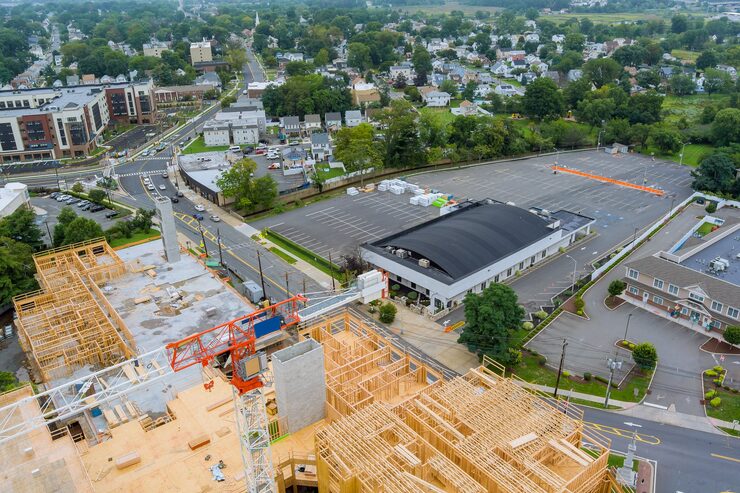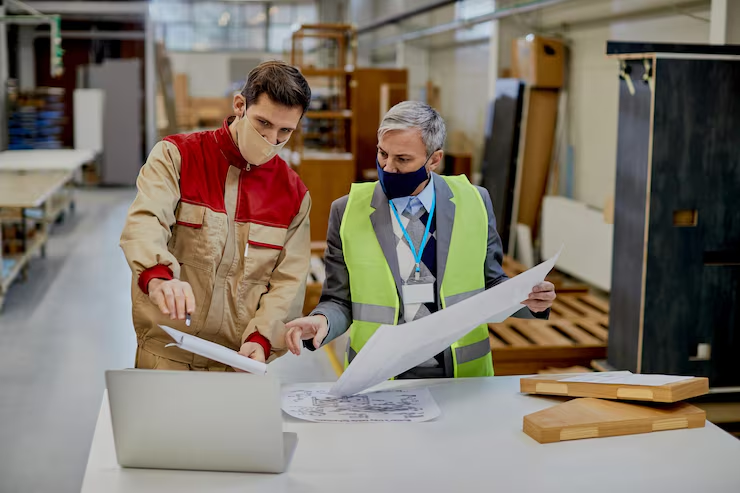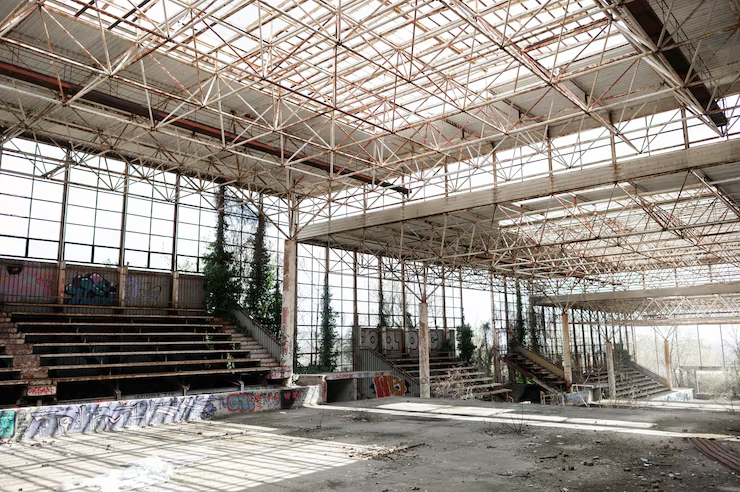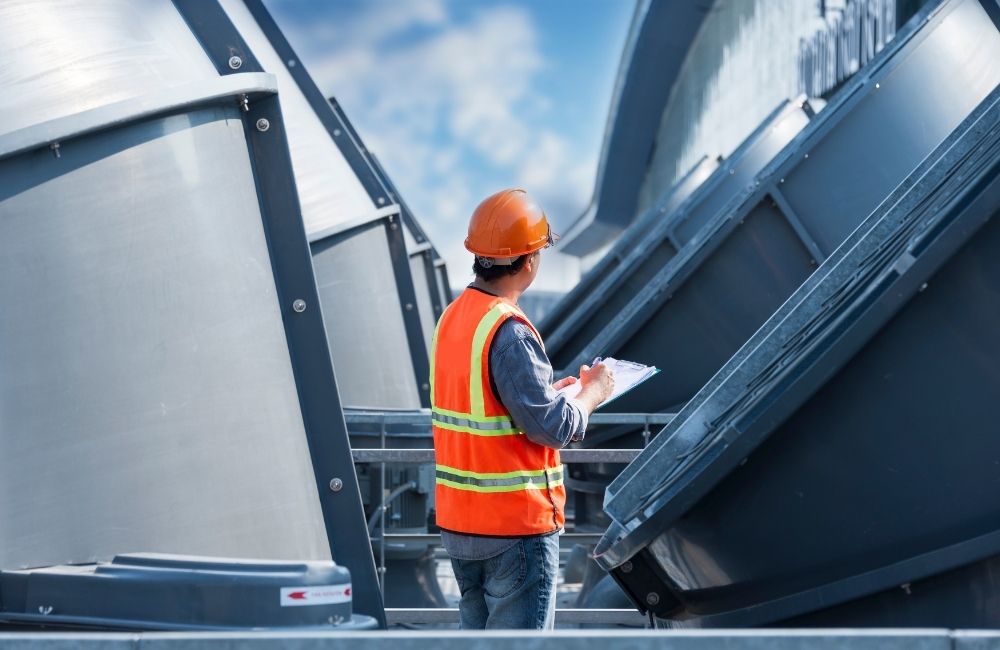When embarking on a warehouse construction project, choosing the right commercial builder is crucial to ensure the facility meets operational needs and is built to last. Commercial construction projects, especially warehouse facilities, come with unique challenges that require expertise, experience, and precision. To achieve optimal results, it is vital to carefully evaluate potential commercial builders before making a final decision. Here are the key factors to consider when selecting commercial builders with warehouse construction expertise.
Table of Contents
1. Builder Experience and Expertise
5. Communication and Project Management
6. Cost Considerations and Transparency
7. Customization and Flexibility
8. Project Timeline and Efficiency
9. Materials and Sustainability
10. Post-Construction Support and Maintenance
11. Innovation and Technology in Construction
Ready to Build Your Next Commercial Project with the Experts?
Key Takeaways
✔ Choose commercial builders with proven experience in warehouse construction to ensure quality and compliance.
✔ Verify the builder’s track record through client testimonials, references, and online reviews to gauge their professionalism.
✔ Opt for financially secure construction companies that can manage expenses and maintain progress without interruptions.
✔ Choose builders with strong safety protocols and compliance with local, state, and federal regulations to avoid legal issues.
✔ Look for general contractors who maintain clear communication and use advanced project management tools.
✔ Request detailed quotations and compare bids without solely focusing on the lowest price to avoid hidden costs.
✔ Select commercial builders who offer tailored solutions and future-proof designs to accommodate evolving needs.
✔ Work with builders who accurately estimate timelines and implement efficient construction methods.
✔ Prioritize builders who use high-quality, eco-friendly materials to extend the warehouse’s lifespan and reduce maintenance.
✔ Choose builders who offer ongoing maintenance plans and warranties to ensure long-term reliability and client satisfaction.
✔ Select builders who adopt cutting-edge construction technologies to enhance accuracy, efficiency, and safety.
1. Builder Experience and Expertise

Choosing commercial builders with the right experience and expertise like Claris Design•Build is paramount when tackling a warehouse construction project. General contractors and construction companies specializing in commercial construction must demonstrate a proven track record and extensive knowledge of the specific demands of warehouse facilities.
Industry-Specific Knowledge
Warehouse construction is vastly different from other commercial construction projects. Building contractors must understand factors like optimal space utilization, structural integrity, and specialized features like climate control and fire safety systems. Experienced commercial builders can navigate these complexities and ensure compliance with industry standards. Choosing general contractors who are well-versed in warehouse construction helps minimize costly mistakes and ensures the project's long-term success.
Portfolio Review
One of the most effective ways to gauge a commercial builder’s capabilities is by examining their portfolio. Reputable commercial construction companies showcase completed projects that highlight their expertise and attention to detail. Look for case studies and project overviews that demonstrate their proficiency in warehouse construction. Pay particular attention to similar projects in terms of size and complexity to assess their ability to deliver quality work.
Client Testimonials and Case Studies
Past clients provide invaluable insight into a builder’s reliability and quality of service. Check testimonials and case studies that discuss the challenges faced and how the commercial builders addressed them. Successful building contractors maintain transparent communication and adapt to unforeseen issues efficiently. Additionally, client feedback helps verify whether the company met deadlines and stayed within budget, essential factors for any commercial construction project.
2. Reputation and Reliability
A builder’s reputation speaks volumes about their professionalism and commitment to quality. Reputable commercial builders like Claris Design•Build often have strong relationships with clients and suppliers, which contributes to smooth project execution. Conducting a thorough reputation check is essential when evaluating general contractors and building contractors.
Researching Company History
Investigating the history of commercial construction companies helps determine their stability and reliability. Look for companies with years of experience and consistent growth, as this indicates financial stability and industry credibility. General contractors with a long-standing presence often demonstrate a strong commitment to customer satisfaction and quality craftsmanship.
Checking References
When choosing commercial builders, directly contacting previous clients is invaluable. Ask about their experiences working with the builder, focusing on project timelines, budget adherence, and overall satisfaction. References help validate whether the builder maintains clear communication and delivers quality work as promised.
Online Reviews and Ratings
Online platforms, including construction industry directories and review sites, can provide unbiased feedback from clients. While evaluating commercial builders, look for consistent positive reviews and high ratings. Be cautious of construction companies with numerous unresolved complaints or those that repeatedly fall short of client expectations.
3. Financial Stability
Financial stability is crucial for commercial construction projects to proceed without delays or disruptions. Choosing financially secure commercial builders reduces the risk of project halts and ensures steady progress.
Assessing Financial Health
A financially stable builder has the resources to purchase materials, pay workers, and manage unexpected expenses without causing project delays. Building contractors should readily provide proof of their financial health, such as balance sheets and credit references. Transparency in financial matters reflects the builder’s professionalism and commitment to the client.
Insurance and Bonding
Insurance and bonding are non-negotiable for any commercial construction project. Adequate coverage protects clients from liabilities arising from workplace injuries or property damage. Additionally, performance bonds ensure that the project will be completed even if the builder encounters financial difficulties. Verifying these credentials before hiring commercial builders is essential for peace of mind.
4. Safety and Compliance
Safety should never be compromised in commercial construction. Proper safety protocols not only protect workers but also ensure compliance with legal regulations. General contractors must prioritize worker safety while adhering to building codes and environmental standards.
Safety Records and Protocols
Reputable commercial builders maintain detailed safety records and implement stringent safety protocols on-site. These measures reduce the risk of accidents and injuries, which can halt progress and result in legal complications. Building contractors with excellent safety records demonstrate their commitment to maintaining a safe work environment.
Regulatory Compliance
Warehouse construction projects are subject to various local, state, and federal regulations. Reliable construction companies are well-versed in zoning laws, building codes, and environmental regulations. Compliance with these standards prevents costly fines and project delays. Always verify that your chosen commercial builders maintain updated knowledge of legal requirements to avoid potential legal complications.
5. Communication and Project Management
Effective communication and meticulous project management are vital for the successful completion of warehouse construction projects. Commercial builders like Claris must establish clear communication channels and employ systematic project management practices to maintain consistency and efficiency.
Clear Communication Channels
Clear and consistent communication between the client and builder is essential throughout the construction process. Reputable general contractors provide regular updates and maintain open lines of communication to address any concerns. Transparent dialogue helps keep the project on track and reduces the likelihood of miscommunication.
Project Management Approach
Experienced commercial builders employ structured project management methodologies to optimize resource allocation and meet deadlines. Building contractors who utilize advanced project management software can efficiently track progress, manage schedules, and address unforeseen challenges. This proactive approach minimizes disruptions and promotes accountability.
Technology Utilization
Modern construction companies leverage technology to enhance project efficiency. Whether using BIM (Building Information Modeling) or project tracking apps, adopting innovative tools helps builders stay organized and responsive. Ensuring that your chosen commercial builders use technology to manage resources and schedules is an excellent indicator of their professionalism.
6. Cost Considerations and Transparency
Budgeting is a critical factor in warehouse construction projects. Ensuring transparency in cost breakdowns and avoiding hidden charges helps clients make informed decisions and prevent budget overruns.
Detailed Quotations
Request comprehensive bids from commercial builders, including line-item costs for materials, labor, permits, and contingencies. Detailed quotations help identify potential expenses upfront and facilitate fair comparisons between construction companies.
Comparing Bids
Do not base your choice solely on the lowest bid. Instead, evaluate the quality of materials, timelines, and additional services offered. Reputable building contractors provide balanced proposals that align with the project's scope and requirements.
Avoiding Low-Bid Pitfalls
While a low bid may seem attractive, it could indicate compromised quality or hidden costs. Experienced commercial builders understand the importance of balancing affordability with quality. Choosing reliable general contractors who prioritize value over the lowest price ensures that the project meets safety standards and quality expectations.
7. Customization and Flexibility
When undertaking warehouse construction projects, customization and flexibility are critical to ensuring the facility meets the unique needs of the business. Modern commercial builders understand that no two warehouses are alike, and designing a space that is both functional and adaptable is essential for long-term success.
Tailored Solutions for Specific Needs
Reputable commercial builders offer customized warehouse designs that cater to the specific operational requirements of each client. Whether the project demands high ceilings for racking systems or expansive floor space for bulk storage, building contractors work closely with clients to develop tailored solutions. Customization not only optimizes workflow but also ensures that the warehouse supports the client’s logistics and inventory management strategies.
Adaptable Design Features
Flexibility is a cornerstone of successful warehouse construction. Commercial builders integrate adaptable design features such as modular layouts, movable partitions, and scalable infrastructure. This approach allows businesses to adjust the layout as needs evolve, whether it involves increasing storage capacity or reconfiguring workspaces. Adaptability reduces the need for future renovations, saving both time and resources.
Future-Proofing Your Warehouse
Future-proofing involves designing warehouses that can accommodate future growth or changes in operations. Experienced commercial builders incorporate elements like pre-installed utilities, expandable structures, and versatile floor plans. By anticipating potential expansion or repurposing needs, general contractors help clients avoid costly upgrades down the line. Future-proof designs are essential for maintaining the warehouse’s relevance as business requirements change.
8. Project Timeline and Efficiency
In commercial construction, efficiency is key to keeping projects on track and within budget. Skilled commercial builders like Claris Design•Build use strategic planning and innovative methods to deliver warehouse projects on time while minimizing disruptions.
Estimating Project Duration
Accurate project timelines are essential for planning and budgeting. Commercial builders leverage their experience to develop realistic schedules, factoring in potential challenges and material availability. Clear timelines help clients prepare for operational transitions and reduce downtime. General contractors communicate regularly with stakeholders to ensure expectations are met and that progress aligns with the projected schedule.
Efficient Construction Methods
Efficient construction practices help accelerate warehouse projects without sacrificing quality. Commercial builders often employ techniques like prefabrication, which allows components to be manufactured off-site and assembled on location. Additionally, using advanced project management software helps monitor progress and identify bottlenecks early on. By optimizing workflows, construction companies can complete projects faster while maintaining high standards.
Dealing with Unforeseen Delays
Despite meticulous planning, unforeseen delays can arise from factors like weather conditions or supply chain disruptions. Experienced general contractors proactively prepare for these challenges by having contingency plans and maintaining open communication with suppliers. As of December 2024, there were 374,000 job openings in the U.S. construction industry, reflecting ongoing labor shortages that can influence project timelines and costs. By keeping clients informed and adapting to unexpected changes, commercial builders minimize downtime and maintain progress. This proactive approach helps avoid costly interruptions and ensures timely completion.
9. Materials and Sustainability
The choice of materials in warehouse construction significantly impacts durability, maintenance requirements, and environmental sustainability. Modern commercial builders prioritize the use of high-quality, eco-friendly materials to create long-lasting and sustainable facilities.
Choosing the Right Materials
Selecting durable materials is essential for warehouse longevity and performance. Commercial builders recommend materials like steel, reinforced concrete, and weather-resistant coatings to withstand heavy usage and harsh conditions. Choosing the right materials also reduces maintenance costs over the warehouse’s lifecycle, saving the client money in the long term.
Energy-Efficient Designs
Incorporating energy-efficient features not only supports environmental goals but also reduces operating costs. General contractors implement energy-saving technologies, such as LED lighting, solar panels, and efficient HVAC systems, to enhance sustainability. Commercial construction companies also consider insulation and ventilation solutions that minimize energy consumption, making warehouses more cost-effective to operate.
Long-Term Maintenance Considerations
Proactively planning for maintenance can extend the warehouse’s lifespan and reduce unexpected expenses. Building contractors use quality materials that withstand wear and tear, reducing the need for frequent repairs. Additionally, incorporating features like easy-to-clean surfaces and corrosion-resistant structures helps maintain the warehouse's aesthetic appeal and functionality over time.
10. Post-Construction Support and Maintenance
Building a warehouse is only the first step—ongoing support and maintenance are vital to preserving its structural integrity and operational efficiency. Reliable commercial builders offer post-construction services that help clients maintain and optimize their investments.
Ongoing Maintenance Plans
Some commercial builders provide maintenance plans to keep the facility in top condition. These plans often include routine inspections, preventive maintenance, and prompt repairs. Ongoing support ensures that minor issues are addressed before they escalate into major problems, safeguarding the warehouse's operational efficiency.
Warranty and Aftercare Services
A reliable commercial construction company stands behind its work by offering warranties and aftercare services. These guarantees cover potential defects or construction faults, giving clients peace of mind. Building contractors committed to quality assurance will also provide guidance on best practices for warehouse maintenance and upgrades.
Long-Term Client Relationships
Maintaining strong client relationships is essential for continued support and collaboration. Top commercial builders stay connected with clients even after project completion, offering guidance on renovations or expansions when needed. This ongoing partnership ensures that the warehouse remains functional and up-to-date, accommodating any operational changes over time.
11. Innovation and Technology in Construction
The construction industry is rapidly evolving, and successful commercial builders stay ahead by adopting modern technologies. Implementing innovative solutions improves accuracy, efficiency, and safety, resulting in superior warehouse construction outcomes.
Technological Advancements in Warehouse Construction
Technologies like 3D modeling and Building Information Modeling (BIM) allow general contractors to visualize the entire project before breaking ground. These tools help identify potential issues early and enhance collaboration among stakeholders. Over the coming years, 81% of construction companies plan to increase their investment in technology integration, reflecting the growing importance of innovation in maintaining competitive advantage. Drone technology also assists with site surveying and progress monitoring, ensuring precision throughout the project.
Smart Warehousing Features
Modern warehouse construction often integrates smart technologies that improve functionality and efficiency. Features like automated storage systems, IoT integration for asset tracking, and smart climate control systems make warehouses more responsive to operational needs. Choosing commercial builders proficient in implementing these advanced systems ensures the warehouse remains competitive in a fast-paced business environment.
Advanced Safety Technology
Safety is paramount in any construction project, and adopting cutting-edge safety measures helps protect workers and property. From wearable tech that monitors workers' health to automated safety inspections using AI, advanced safety technologies reduce the risk of accidents. General contractors committed to safety demonstrate professionalism and dedication to worker welfare, fostering a secure work environment.
Frequently Asked Questions
What types of projects do commercial builders typically undertake?
Commercial builders work on a variety of non-residential projects, including office buildings, retail centers, warehouses, industrial facilities, and healthcare centers. They also handle large-scale developments like shopping malls and mixed-use complexes. Each project requires specialized knowledge and adherence to commercial building codes.
How do commercial builders ensure compliance with local zoning laws?
Commercial builders conduct thorough reviews of zoning regulations and building codes before starting any project. They collaborate with legal experts and local planning departments to ensure compliance throughout the construction process. Regular inspections and permit management are integral parts of maintaining compliance.
What role do commercial builders play in the design phase of a project?
Commercial builders are increasingly integral to the design phase—especially within a Design-Build model, like that of Claris Design Build. By collaborating directly with architects and clients from the start, they help ensure that designs are practical, cost-effective, and ready to build. Early involvement allows builders to:
- Align design with budget and schedule
- Streamline communication through a single team
- Minimize delays and change orders
- Enhance build quality with real-world construction insight
This integrated approach leads to a smoother process and stronger project outcomes.
How do commercial builders manage subcontractors during a project?
Commercial builders take responsibility for selecting qualified subcontractors and coordinating their schedules to ensure project efficiency. They monitor the quality of workmanship and maintain communication to keep the project on track. Proper management helps avoid delays and ensures that all aspects meet industry standards.
What is the difference between commercial builders and residential builders?
Commercial builders focus on non-residential projects like offices, warehouses, and industrial complexes, requiring different materials and building codes. In contrast, residential builders specialize in homes and apartment buildings with a greater focus on aesthetics and comfort. Commercial projects are typically larger in scale and involve more complex safety and compliance requirements.
Ready to Build Your Next Commercial Project with the Experts?
Choosing the right commercial builder is essential for the success of your warehouse construction project. When you partner with Claris Design•Build, you get the expertise, innovation, and reliability needed to bring your vision to life. As a leading name in commercial construction, Claris Design•Build specializes in design-build services, architecture, construction management, and general contracting.
Get in touch with Claris Design•Build today and let our team of professionals guide your project from concept to completion. Your dream warehouse is just one call away—partner with the experts to ensure your project’s success!









